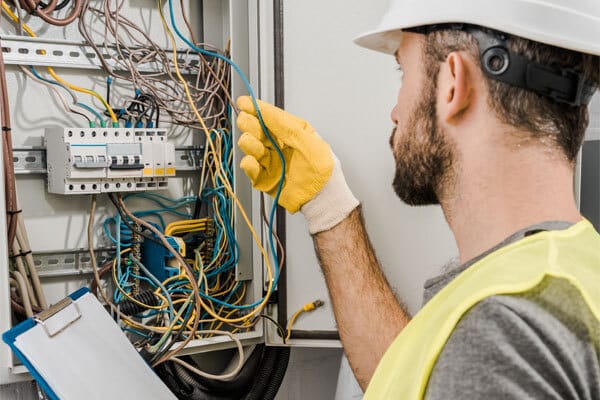Ensuring the safety and efficiency of your home’s electrical system is crucial, with the electrical panel playing a pivotal role. If you’re in Denver and considering replacing or repairing your electrical panel, knowing the costs involved is essential. This article dives into various factors that affect the cost of electrical panel replacement in Denver, to help you make an informed decision.
What is an Electrical Panel and Why is it Important?
An electrical panel, often referred to as the breaker box, service panel, or distribution board, is a crucial component of your home’s electrical system. It serves as the central hub where the electrical power from the utility company enters your home and is distributed to the various circuits that supply power to lights, outlets, and appliances. Let’s break down the functions and importance of the electrical panel in more detail:
Connecting to the Utility Grid
The electrical panel is the point where your home’s wiring connects to the main power line provided by the electrical utility company. A main breaker, usually located at the top of the panel, controls the amount of electricity that can enter the home. This breaker is essential for safety as it can be used to cut off all electrical power to the house in case of emergencies.
Distributing Power
Inside the electrical panel, there are multiple circuit breakers or fuses. Each of these is connected to a different area or aspect of your home’s electrical system. For example, one circuit might supply power to the kitchen lights, while another might be dedicated to the upstairs bedrooms. When the electrical panel distributes power, it ensures that each circuit receives the correct amount of electricity needed for its specific appliances and outlets.
Safety and Circuit Protection
One of the critical roles of an electrical panel is to protect your home from electrical hazards like short circuits and overloads. When there’s an excessive current flowing through a circuit, the respective circuit breaker trips and cuts off the electrical flow to that circuit. This action prevents the wires from overheating, which could otherwise lead to electrical fires. In older homes with fuse boxes, the fuse will blow instead of a breaker tripping, serving the same purpose.
Accommodating Modern Electrical Needs
As technology evolves, so do our electrical consumption habits. Modern homes generally have more electrical appliances than older ones. The electrical panel must be able to handle this increased load safely. When upgrading or renovating a home, it’s sometimes necessary to also upgrade the electrical panel to ensure it can handle the new electrical demands.
In summary, the electrical panel is an integral part of your home’s electrical system. It not only connects your home to the utility grid and distributes power but also protects against electrical hazards and ensures compliance with regulations. Regular upgrades or repairs of the electrical panel are essential to the safety and efficiency of your home’s electrical infrastructure.
What is the Average Electrical Panel Replacement Cost in Denver?
The cost of replacing an electrical panel in Denver is influenced by the panel’s location, the age and condition of existing electrical work, materials needed, and the amperage of the new box.
With so much variability in the price, it’s important to understand the factors that go into these calculations. And, in some instances, the sticker price of the repair might be higher, but could give you a better return on your investment in the long run.
Types of Electrical Panels and Amperage
There are different types of electrical panels, such as the main breaker panel, main lug panel, fuse boxes, and subpanels. The amperage required also impacts the cost.
In Denver, homeowners must also consider local building codes and material requirements, which may impact the costs.
Additional Costs
Additional costs may include replacing associated materials like wiring, old receptacles, fuses, and damaged circuits. Also, labor constitutes a significant portion of the budget, taking up at least 20 hours of work, with professional electricians charging $50 to $150 per hour. Moreover, permits are required for electrical panel replacement, ranging from $50 to $300.
Upgrading for Future-Proofing
With the growing popularity of electric vehicles and renewable energy sources like solar panels, many homeowners are upgrading their electrical panels to accommodate these technologies. According to This Old House, upgrading an electrical panel to support solar panels or electric vehicles can also increase the value of your home, which is particularly relevant in Denver due to the abundance of sun and the competitive real estate market.
Adhering to Local Requirements and Regulations for Electrical Work in Denver
When it comes to the repair or replacement of electrical panels in Denver, Colorado, it’s paramount to be cognizant of and comply with local requirements and regulations. Denver, like many cities, has established specific codes and guidelines that are aimed at ensuring the safety and reliability of electrical systems.
Here’s why adhering to these local standards is crucial:
Safety
First and foremost, the primary objective of electrical codes and regulations is to safeguard the well-being of the occupants. Faulty or non-standard electrical work can be a substantial hazard, leading to electrical fires, shocks, or other dangerous situations. Denver’s electrical codes are designed with the city’s particular conditions in mind, including weather and altitude, which can affect electrical systems. Following these guidelines ensures that your electrical panels are safe and reliable.
Legal Compliance
Non-compliance with local codes can result in legal consequences. Depending on the severity of the violation, property owners may be subjected to fines, or in extreme cases, forced to vacate the property until it is brought up to code. This is especially true for rental properties, where landlords have a legal responsibility to provide a safe living environment.
Insurance
Insurance companies often require compliance with local codes as a condition of coverage. If an electrical fire or other incident occurs and the insurance company finds that the electrical system was not up to code, they may refuse to cover the damages. Ensuring that your electrical panels are repaired or replaced according to local regulations can be essential for maintaining insurance coverage.
Property Value and Resale
When you decide to sell your property, potential buyers or real estate agents might request an inspection. If your electrical panels or system are not up to the local codes, this can be a red flag for potential buyers and might require you to reduce your asking price or fix the issues before sale.
Efficiency and Functionality
Denver’s electrical codes are not just about safety; they’re also about ensuring that electrical systems are efficient and functional. This is particularly important in a city like Denver, where environmental conditions can place additional strains on electrical systems. Properly installed electrical panels that comply with local regulations will be more likely to function effectively and efficiently.
Peace of Mind
Knowing that your electrical panels have been repaired or replaced according to Denver’s local codes provides peace of mind. You can rest assured knowing that your home’s electrical system is safe, efficient, and in compliance with the law.
When undertaking any electrical panel repair work in Denver, it’s advisable to hire a licensed and reputable electrician who is familiar with Denver’s electrical codes and regulations. Not only will this ensure that the work is performed safely, but it will also help avoid any potential legal or financial issues down the road. Compliance with local standards is an essential aspect of maintaining a safe and efficient home in Denver.
When Should You Replace Your Electrical Panel?
Being vigilant for signs that indicate a need to replace your electrical panel is essential for maintaining safety and efficiency. Keep an eye out for flickering lights, frequently tripping breakers, and appliances overheating, as these can suggest the panel is struggling with the electrical load. It’s critical to attend to any burning smell near the panel, which might imply a short circuit or wiring issue. The use of fuses instead of circuit breakers, the age of the panel exceeding 25 years, visible damage such as rust or corrosion, and difficulty in resetting breakers are all red flags.
Timely recognition and action are vital in averting potential hazards. If you notice any of these signs, immediately consult a professional electrical service provider. It’s imperative, especially if your panel is old, as it may not meet contemporary safety standards and might be ill-equipped for modern electrical needs. Regular updates and attentiveness can assure the safe and efficient operation of your home’s electrical system.
Conclusion
The cost to repair or replace an electrical panel in Denver varies based on several factors including amperage, local regulations, and the condition of your existing panel. Upgrading your electrical panel not only ensures the safety and efficiency of your home’s electrical system but can also be an investment toward a greener future.
Consult a professional electrician to evaluate your specific needs and ensure compliance with Denver’s building codes and regulations.
With Ultimate Electrical Services, you are opting for decades of experience and a commitment to excellence. Contact our team today for all of your home’s electrical needs, especially when it comes to repairing your electrical panel.
Call us now at [theme_company_telephone] or contact us to schedule a consultation.


